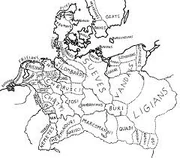ML4E (Message Wall | contribs) mNo edit summary |
GusF (Message Wall | contribs) |
||
| Line 5: | Line 5: | ||
In the Augustean period there was — as a result of Roman activity as far as the [http://en.wikipedia.org/wiki/Elbe_River Elbe River]— a first definition of the "Germania magna": from Rhine and [[Danube]] in the West and South to the [http://en.wikipedia.org/wiki/Vistula_River Vistula] and the Baltic Sea in the East and North. Caesar's wars helped establish the term Germania. The initial purpose of the Roman campaigns was to protect Transalpine Gaul by controlling the area between the Rhine and the Elbe. In 9 CE, a revolt of their Germanic subjects headed by the supposed Roman ally, Arminius, (along with his decisive defeat of Publius Quinctilius Varus and the destruction of 3 Roman legions in the surprise attack on the Romans at the [[Battle of the Teutoburg Forest]]) ended in the withdrawal of the Roman frontier to the Rhine. |
In the Augustean period there was — as a result of Roman activity as far as the [http://en.wikipedia.org/wiki/Elbe_River Elbe River]— a first definition of the "Germania magna": from Rhine and [[Danube]] in the West and South to the [http://en.wikipedia.org/wiki/Vistula_River Vistula] and the Baltic Sea in the East and North. Caesar's wars helped establish the term Germania. The initial purpose of the Roman campaigns was to protect Transalpine Gaul by controlling the area between the Rhine and the Elbe. In 9 CE, a revolt of their Germanic subjects headed by the supposed Roman ally, Arminius, (along with his decisive defeat of Publius Quinctilius Varus and the destruction of 3 Roman legions in the surprise attack on the Romans at the [[Battle of the Teutoburg Forest]]) ended in the withdrawal of the Roman frontier to the Rhine. |
||
| − | ==Germanic tribes in |
+ | ==Germanic tribes in ''[[Give Me Back My Legions!]]''== |
| − | The''' |
+ | The '''Germanic tribes''' of [[Cherusci#Cherusci in Give Me Back My Legions!|Cherusci]], Marsi, Chatti, Bructeri, Chauci and Sicambri under the command of the son of the Cherusci tribe leader, [[Arminius#Arminius in Give Me Back My Legions!|Arminius]], ambushed three [[Roman Legion#Roman Legion in Give Me Back My Legions!|Roman Legions]] in the [[Teutoberg Forest#Teutoberg Forest in Give Me Back My Legions!|Teutoberg Forest]]. |
| − | The Legions were under the command of the Military Governor of [[Germania]], [[Publius Quinctilius Varus]], were sent out to pacify the Germans so that the region could be brought under the control of the [[Roman Empire]]. Unwilling to be under Roman rule, Arminius, who was trusted by Varus, organized the tribes together and annihilated them at Teutoberg. |
+ | The Legions were under the command of the Military Governor of [[Germania]], [[Publius Quinctilius Varus#Publius Quinctilius Varus in Give Me Back My Legions!|Publius Quinctilius Varus]], were sent out to pacify the Germans so that the region could be brought under the control of the [[Roman Empire#Roman Empire in Give Me Back My Legions!|Roman Empire]]. Unwilling to be under Roman rule, Arminius, who was trusted by Varus, organized the tribes together and annihilated them at Teutoberg. |
| − | Later, Augustus received the preserved head of Varus from [[Maroboduus]] leader of the [[Marcomanni]], whom Arminus had tried to persuade to join in the fight against the Romans. However, the Marcomanni had refused. |
+ | Later, Augustus received the preserved head of Varus from [[Maroboduus#Maroboduus in Give Me Back My Legions!|Maroboduus]], the leader of the [[Marcomanni#Marcomanni in Give Me Back My Legions!|Marcomanni]], whom Arminus had tried to persuade to join in the fight against the Romans. However, the Marcomanni had refused. |
==Germanic tribes in "[[Household Gods]]"== |
==Germanic tribes in "[[Household Gods]]"== |
||
Revision as of 23:02, 14 February 2014
The term "Germanic tribes" originated in classical times, when groups of tribes were referred to using this term by Roman authors. For them, the term was not necessarily based upon language, but rather referred to tribal groups and alliances who were considered less civilized, and more physically hardened, than the Celtic Gauls living in the region of modern France. Tribes referred to as Germanic in that period lived generally to the north and east of the Gauls.

Map of Germanic Tribes.
The Cimbri and Teutoni incursions into Roman Italy were thrust back in 101 BCE. These invasions were written up by Caesar and others as presaging of a Northern danger for the Roman Republic, a danger that should be controlled.
In the Augustean period there was — as a result of Roman activity as far as the Elbe River— a first definition of the "Germania magna": from Rhine and Danube in the West and South to the Vistula and the Baltic Sea in the East and North. Caesar's wars helped establish the term Germania. The initial purpose of the Roman campaigns was to protect Transalpine Gaul by controlling the area between the Rhine and the Elbe. In 9 CE, a revolt of their Germanic subjects headed by the supposed Roman ally, Arminius, (along with his decisive defeat of Publius Quinctilius Varus and the destruction of 3 Roman legions in the surprise attack on the Romans at the Battle of the Teutoburg Forest) ended in the withdrawal of the Roman frontier to the Rhine.
Germanic tribes in Give Me Back My Legions!
The Germanic tribes of Cherusci, Marsi, Chatti, Bructeri, Chauci and Sicambri under the command of the son of the Cherusci tribe leader, Arminius, ambushed three Roman Legions in the Teutoberg Forest.
The Legions were under the command of the Military Governor of Germania, Publius Quinctilius Varus, were sent out to pacify the Germans so that the region could be brought under the control of the Roman Empire. Unwilling to be under Roman rule, Arminius, who was trusted by Varus, organized the tribes together and annihilated them at Teutoberg.
Later, Augustus received the preserved head of Varus from Maroboduus, the leader of the Marcomanni, whom Arminus had tried to persuade to join in the fight against the Romans. However, the Marcomanni had refused.
Germanic tribes in "Household Gods"
The Roman town of Carnuntum, close to Germania, was attacked by Germanic tribes called the Marcovedi and the Quadi. The two tribes had first were able defeat the Roman legionaries but were later driven out of the town, with some being taken prisoner.
Nicole Gunther-Perrin, a time-traveller in the body of a tavern-keeper, was shocked at the brutality the Germans displayed and was dismayed that the Romans had such bad security. In fact, one of her friends was raped by a German soldier.
| ||||||||||
| |||||||||||
